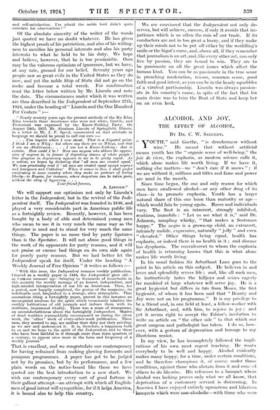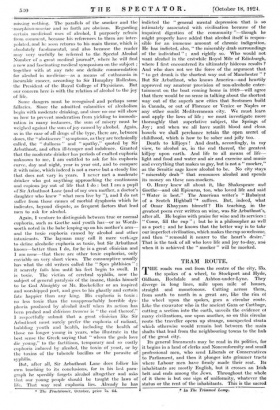ALCOHOL AND JOY.
THE EFFECT OF ALCOHOL.
BY DR. C. W. SALEEBY.
" yTOU II,' ,' said Goethe, "is drunkenness without wine., He meant that without artificial means youth has the "organic sense of well-being," the joie de vivre, the euphoria, as modern science calls it, which alone makes life worth living. If we have it, nothing else matters—we " don't care if it snows" ; if we are without it, millions and titles and fame and power are mud in the mouth.
Since time began, the one and only reason for which men have swallowed alcohol—or any other drug of its class—is to promote euphoria. Youth has a larger natural share of this one boon than maturity or age— which would fain be young again. Races and individuals vary. The Scot is an introvert, strongly inhibited, cautious, immobile : "Let us see what it is," said Dr. Johnson, sampling whisky, "that makes A Scotsman happy." The negro is a grown-up child, an extravert, intensely mobile, expressive, naturally " jolly " and even "elevated." Other things being equal, health has euphoria, or indeed there is no health in it ; and disease has dysphoria. The convalescent to whom the euphoria of health is returning knows that this is what alone makes life worth living.
In his usual fashion Sir Arbuthnot Lane goes to the point in his article on this subject. Ile believes in and loves and splendidly serves life ; and, like all such men, he instinctively hates the killjoys and seizes eagerly for mankind at large whatever will serve joy. He is a great hygienist but differs in toto from Moses, the first hygienist, of whom it has been said that "Beauty and Joy were not on his programme." It is my privilege to be a friend and, in one field at least, a fellow-worker with Sir Arbuthnot, and, with him, to rejoice in joy ; and yet it seems right to accept the Editor's invitation to write an article on "the other side" to that which our great surgeon and pathologist has taken. I do so, how- ever, with a gesture of deprecation and homage to my illustrious senior.
In my view, he has incompletely followed the impli- cations of his own- most cogent teaching. He wants everybody to be well and happy. Alcohol evidently makes many happy, for a time, under certain conditions, and he therefore champions it, of course under those conditions, against those who abstain from it and cour others to do likewise. His reference to a. banquet where alcohol was lacking proves only what we all know, that deprivation of a customary servant is distressing. In America I have enjoyed entirely uproarious and hilarious banquets which were non-alcoholic—with those who were • missing nothing. The parallels of the _smoker and . the • morphino-maniac and so forth are obvious. Regarding.
certain medicinal uses of alcohol, I purposely refrain • from comment, because his references to them are inter- polated, and he soon returns to his main theme, which is • absolutely fundamental, and also because the reader - may very usefully be referred to the- Special Alcohol Number of a great medical journal*, where he . will find a new and fascinating medical symposium on the subject ; together with at any rate one definite commendation- - for alcohol in medicine—as a means of euthanasia in incurable cancer, according to Sir Humphry Rolleston, • the President of the Royal College of Physicians. But our concern here is with the relation of alcohol to the joy of life.
Some dangers must be recognised and perhaps sonic fallacies. Since the admitted calamities of alcoholism begin with moderate drinking, and since no one will show us how to prevent moderation from yielding to immode- ration in many instances, the sum of misery must be weighed against the sum of joy caused by alcohol. Again, as in the case of all drugs of the type, there are, between • doses, the " abstinence " symptoms, as they arc technically called, the "dullness " and "apathy," - quoted by Sir Arbuthnot, and often ill-temper and indolence. Granted that the moderate drinker has periods of exalted euphoria unknown to me, I am entitled to ask for his euphoria curve, day and night, year in year out, and to compare it with mine, which indeed is not a curve but a steady line that does not vary in years. I never met a moderate drinker who got anything approaching the continuous and copious joy out of life that I do : but I am a pupil of Sir Arbuthnot Lane (and of my own mother, a doctor's daughter who knew "what men live by "), and I do not suffer from those causes of morbid dysphoria which he indicates, beyond dispute, as frequent factors that lead men to ask for alcohol.
Again, I venture to .distinguish between true or normal euphoria, such as Goethe said youth has—or as Words- worth noted in the babe leaping up on his mother's arm— and the toxic euphoria caused by alcohol and other intoxicants. The layman may call it mere verbiage to define alcoholic euphoria as toxic, but Sir Arbuthnot knows—better than I do, for he is a great clinician and I am none—that there are other toxic euphorias, only enviable on very short views. The consumptive usually has what the old writers called the " Spes phthisica " ; it scarcely fails him until his feet begin to swell. It is toxic. The victim of cerebral syphilis, now the subject of general paralysis of the insane, thinks himself to be God Almighty or Mr. Rockefeller or an inspired and worshipped poet, and goes to his ghastly and certain fate happier than any king. His euphoria is toxic : no less toxic than the unapproachably horrible dys- phoria produced by alcohol itself when its action has been pushed and delirium tremens is "the end thereof." I respectfully submit that a great clinician like Sir Arbuthnot must surely prefer the euphoria of radiant, bubbling youth and health, including the health of those no longer young in 'years, who illustrate in the best sense the Greek saying that "whom the gods love die young," to the factitious, temporary and so costly euphoria induced by alcohol, the toxin of yeast, or by the toxins of the tubercle bacillus or the parasite of syphilis.
But, after all, Sir Arbuthnot Lane does follow his own teaching to its conclusions, for in his last para- graph he speedily forgets alcohol altogether and asks that our young people should be taught the laws of life. That way real euphoria lies. Already he has * The Practitioner, October, price 78. 6d. indicted the "general niental depression that is so intimately associated with civilisation because of the impaired digestion of the community "—though he might properly have added that alcohol itself is respon- sible for an immense amount of chronic indigestion. He has indicted, also, "the miserably drab surroundings of the individual " ; and rightly so.- Who would not want alcohol in the erstwhile Royal Mile of Edinburgh, where I first encountered its ultimately hideous results! And who does not see the force of the argument that "to get drunk is the shortest way out of Manchester " ? But Sir Arbuthnot, who knows America—and heartily approved my amateur provision of non-alcoholic enter- tainment on the boat coming home in 1919—will agree that there would be no sense in talking about the shortest way out of the superb new cities that Scotsmen build in Canada, or out of Florence or Venice or Naples or any other sunlit Mediterranean city. We must learn and apply the laws of life ; we must investigate more thoroughly that superlative subject, the Springs of Joy ; and when we all have sunlit blood and clean bowels we shall perchance retain the open secret of childhood, which is how to be sober and jolly too. .
Death to killjoys ! And death, accordingly, in my view, to alcohol as, in the end thereof, the greatest killjoy upon earth. And life to all means of life— light and food and water and air and exercise and music and everything that makes us gay, but is not a" mocker," as the Semitic sage knew alcohol to be. No city stays "miserably drab" that renounces alcohol and spends its money on these non-mockers.
0. Henry knew all about it, like Shakespeare and Goethe—and old Epicurus, too, who loved life and said "Water is best." The American writer's " Rubaiyat of a Scotch Highball "* suffices. But, indeed, what of Omar Khayyam himself ? His teaching, in the greatest poem ever written on wine, was Sir Arbuthnot's, after all. He begins with praise for wine and its services : "Come, fill the cup " ; but he is a philosopher as well as a poet ; and he knows that the better way is to take our imperfect civilisation, which makes the cup so welcome, and then "remould it nearer to the heart's desire." That is the task of all who love life and joy to-day, and when it is achieved the " mocker " will be mocked,



























































 Previous page
Previous page